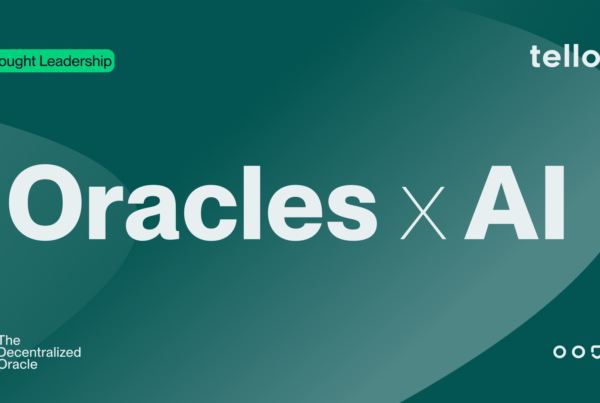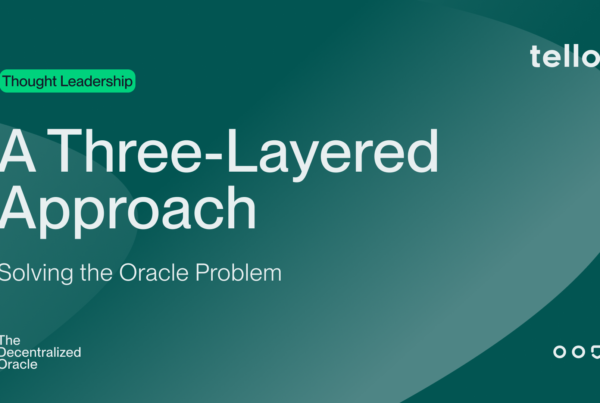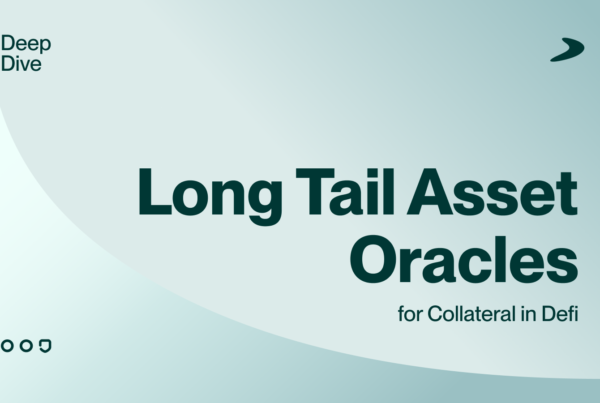We, the blockchain.
The blockchain sold to us is far from reality.
Cryptographic security.
Immutability.
Code is law.
The permanent, unchanging global database of interconnected nodes.
…………
Despite nearly a decade of rhetoric, cryptocurrencies and the decentralized world surrounding them are not a revolution of money, databases, or even cryptography. Rather, it is a revolution of governance. Crytpo enables the anonymous organization of a collective community; it creates a We of the blockchain.
The security feature which protects these systems is not some unbreakable cryptographic protocol that just came into existence or any form of immutability writing our transactions in stone, but conversely truth that is agreed upon by participants in the network. And this truth is subjective; It’s a little odd, but “reality” is what We decide it is, and the entire revolution of blockchains has simply enabled a path for us to create systems that are economically incentivized to perform a given task for a group of individuals. Decentralization is simply a term to indicate this system and the participants involved are not a corruptible or profitably bribable entity as a whole. Decentralization is when the goal of the system itself is above the desires or whims of any individual or group of individuals.
Decentralization is hard.
It’s an enigma.
Achieving it is a struggle that can only organically be overcome. It can be present in one instance and disappear a moment later as parties choose to cooperate or organize. It’s a challenge to achieve or even identify it, but we must realize what decentralization is not.
In many cases, cooperation amongst parties in any way, is seen as centralized. It has become dangerous that any form of non-codified cooperation is slandered to be the figurative embodiment of a singular digital entity. The dogmatic pandering of “code is law” or the fear of altering the system in any manner happens when parties treat decentralization itself as the goal.
But the goal should be the reason for which the blockchain exists, it’s underlying purpose. What did We build this for?
Censorship resistance, digital money to support global transactions, unwavering privacy, or even a goal of supporting certain behavior within a specific ecosystem; these are the goals. Decentralization is achieved when the creating or controlling parties are abstracted and cannot be reestablished. The goal takes precedence and perseveres.
But now the hard questions arise: How do you create a company, the software, the crypto-economic protocol, that is the embodiment of a set of ideals? How do you maximize the chances that the goal survives and not just the protocol? How do you not only secure the code but the philosophy of why there is the code? These are the questions We must constantly wrestle with and strive to answer. And to do so requires us to remember the purpose. It requires us to carry the purpose onward to the future We.
Children of purpose.
To give the best example of a blockchain or decentralized system, imagine 6 children sitting in a circle playing cards (“War” for instance). Cryptography ensures the deck is fair and not stacked. But the result of who wins each round isn’t something set in stone. The initial distribution of cards, the rules of the game, even what they do when someone is out of cards; these are all variables. If the children don’t like one of the parties playing, they can simply stop playing with them. If one party wins too often, the group can decide to redistribute the wealth. And if two of the children want to start their own game with new variables like, Jokers are wild, then they are free to exit the game and go play in another corner.
As is easy to tell in this simple model, the security for any individual in the game is the likelihood that the other parties will not want to exit the game, kick you out of the game, or change the rules. Decentralization is the idea that one party is not in control of the game. It does not mean that immutability is paramount or that we all have to accept the result of the initial set of rules and variables.
It sounds simple and obvious but, if the goal of the card game is fun for the children, then they should play while they’re having fun, and if not, make changes that make it fun.
The We of security.
Whether a protocol is its own blockchain or even a smart contract with a governance protocol, you can always fork away. The party/ parties with the ability to fork controls the system. The question of who controls a system cannot be answered by some governance protocol or codified voting mechanism; it can only be answered off-chain.
This is because a fork is successful only if the majority of the value goes to the new chain. This is the key tenet of open source protocols. Non-determinism in the sense that We can always revert.
For an early stage protocol still being rapidly iterated upon and developed, the party that’s doing the development is the We, because they call the shots. They’re the ones adding value and if you fork them out, you better have excellent devs ready to take their place or the fork will not succeed.
If you’re a little bit further along on your chain, those who have the strongest relationship with customers come next. If you’re an oracle and 4 companies read your data and provide all of the transaction usage for your contract, then the chain/contract that they subscribe to will likely win. If there’s a split between the developers and the customers, you’ll have a great indication of how ‘complete’ the community thinks the protocol is. If your success relies on upgrades or support from the team, they control the future. But if on the other hand, the protocol is more or less complete, the group that add the most value to the system rules. For Bitcoin, a supposed store-of-value coin, the party that gives Bitcoin its value is in control. An example is if one party owns 40% of Bitcoin, they could dump their holdings and drastically reduce the ‘value’ almost instantaneously. If the utility of your chain is not in the price but rather some ability, then it becomes harder for passive token holders to subvert control (although fear of price swings can be a powerful motivator for the real decision makers).
Further down the food chain in terms of command of a protocol, we have those in the section of the security providers (aka miners and stakers). The reason these parties are last is that they’re ultimately replaceable. As any employer can attest to, the more replaceable an employee is, the less bargaining power they have. For PoW especially, the majority of the security is held in the non-determinism of the chain, not in the difficulty to break PoW (which is shockingly low), so the miners are ultimately just a paid participants giving us the benefits of more certainty in our chain. If there was a system where they were irreplaceable, it could be different, but for now the customers and developers are much more likely to be the primary decision makers for these decentralized networks.
Magnetic Defaults.
Defaults are the initial system, the status quo, the original rules to the game.
Defaults are powerful things.
…and the bigger a community grows the more powerful they become.
I think it’s fair to suggest there is a is a strong and natural tendency in most communities to grow as much as they can. When economically incentivized to bring on new users, it is therefore in the interest of the parties involved to bring on as many newcomers possible. The communities push for things that will influence this growth: A new exchange listing, getting a company to accept your token, achieving regulatory approval, the mythical institutional investor.
But this is dangerous for any community wishing for its purpose to survive. When expansion and profit become the focus the values of a system are lost. The philosophical backings that once led the project to its creation or initial rise are set aside for short term value creation in favor getting new users onboard. But the problem is that these users are now part of the We. The new users grow and grow until the necessary quorum to change the protocol (51% or more for signaling purposes) is unachievable. This is why systems trend toward the default. The faster a community grows for the wrong reasons the stronger the magnetic pull towards the default is. It’s a simple trend toward safety, a reversion to the mean, and the reasons make sense; the more opinions a system has, the harder it is to agree on anything but the most obvious or well documented intentions.
But the inability to change the default is not a hallmark of success. Cooperation amongst interested parties is not a bug.. Systems are built for a specific purpose. If the system doesn’t change, the purpose of the system will have to.
Purpose for fit
Some projects are trying to create governance for changing their protocols and signaling what the community wants. They’re putting in representatives, adding informal processes and regulations. The community is quickly realizing that we’re not replacing money or computing, we’re replacing the governance of these processes. And this is where the community means everything.
We have to think long and hard about what we’re replacing. The real revolution of these systems is that now a group of sovereign individuals are not confined by a physical border. We can have a global community of like minded people. And we need to keep it like-minded.
If we push for everyone to join our system, then we get the same system we already have on a global scale. We’ll have a global democracy and representative government with known demagogues and corporate influence all now on a blockchain. We’ll vote to block the same things and we’ll legislate to create the same morality.
The revolution will be pointless.
If you want to change something, you need different people in your system as the decision makers. If newcomers want in your system, make them understand and accept your values or they will push and adopt their own.
Who are We?
There’s an interesting debate going on within cryptocurrency communities: How do we keep the purpose? Do we need to define who We are?
This debate usually begins with an individual who’s an early adopter claiming that the system is degrading; losing its values as more speculators and users co-opt the network for their own benefits (usually short term profit). Whether it’s the idea of Bitcoin originally branding itself as money, Ethereum as an unstoppable computer, or countless other cryptos as anything but a centralized scams, how specific and strict a community designs and markets its ideals has been left to the figureheads that were first to build or adopt each system.
And crypto isn’t alone with in dealing with these issues of organic communities. Religions have long had to deal with the charlatan zealot spinning off a religion in a new direction.
“No, this is what the Bible truly meant!”
For those unfamiliar with the Christian church; it has hated other parts of itself for basically as long as it’s been in existence. For every external religion that it claimed as false, each specific brand of Christianity declared 10 other branches of Christianity in error of such magnitude that it often demanded eternal damnation. And for those that trial the different sects of the cross, it’s always easy to note that the size of the church is almost directly inverse to its strictness regarding doctrine. Legalistic debates regarding the true nature of the eucharist (is it literally Jesus’s body and blood or just a metaphor?), the Bible’s stance on birth control, or the nature of angels often overshadows any ultimate goal of getting people to care about each other (and/or Jesus in this case).
If the details do matter, then they need to be specified. But if they don’t and you’re ok with differing opinions, just remember that the opinions will change and those issues that were not drilled into your supporter’s minds will be up for debate and ultimately changed. And this is where the question lies for blockchains.
Maybe we do want a small group of fervent supporters who are uniform in all decisions threatening to face the protocol.
Or maybe our goal is broader (e.g. borderless money or a system to create a more equitable distribution of capital) and we want to leave the legalese to the scholars. You see the religions that do well here; the Joel Osteen’s and Joyce Meyer’s of the world who preach kindness with no reference a point of contention (or maybe revenue to the founders is the goal). I don’t think there’s a right answer, but it should be a conscious decision as the desire for a broad community can be significantly hindered by decisive language, while a small group of revolutionaries and truly radical ideas need it to survive.
Ultimate meaning.
Figure out your purpose and build your community accordingly. Keep paying attention to your community as your purpose may change.
If you’re in this to capture the masses through network effect, grow your influence and careless for philosophy of your movement’s change, then go for it. Accept all and promote the acceptance of all. Appease the masses.
But if you have a different plan; if your project cares to fulfill a purpose with radical intensity, then don’t give in. Keep a close-knit community. Tightly held tokens with people who believe in your project and even more so your vision for the project. Think carefully about the crowd you try to bring in and what they will ultimately do to the integrity of your protocol.
Homogenous, but distributed and anonymous views should be the true goal of a censorship resistant community. What actions to take in the case of an attack, what action to take in the case of a lawsuit, US court order to revert actions, or even whether your system should make performance upgrades; think hard about these answers because you will hopefully have to answer them.
This is our card game, let’s not pretend it’s something different.
-Nicholas Fett



